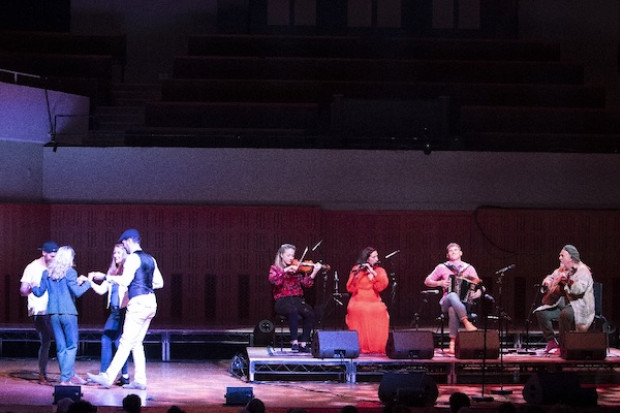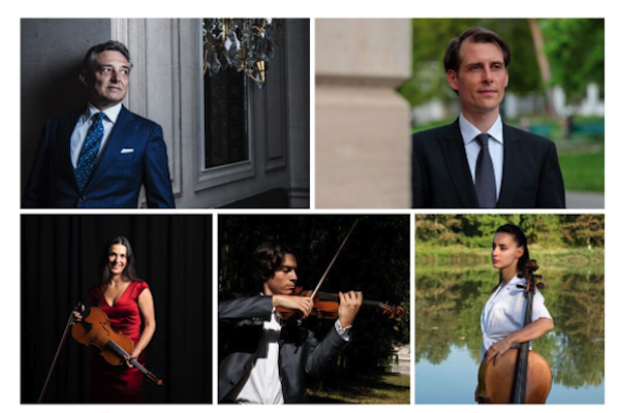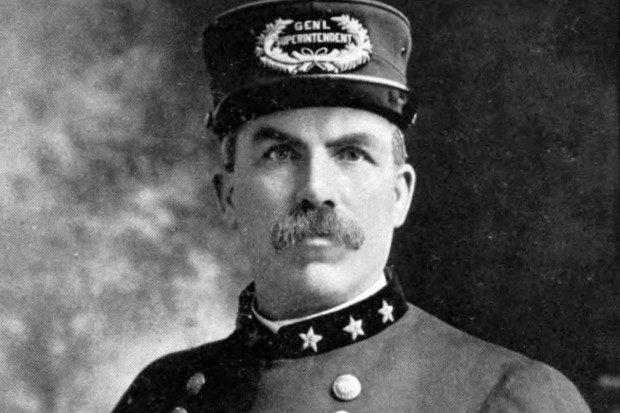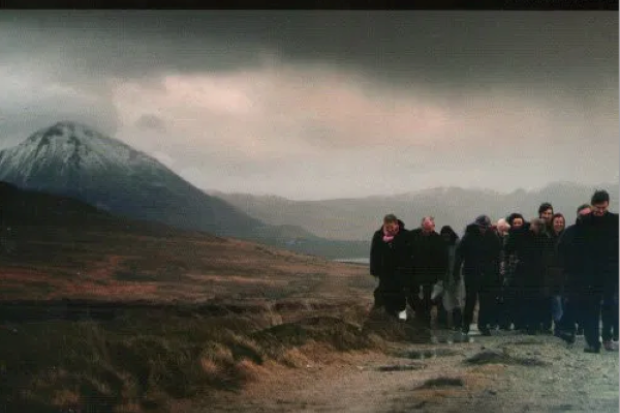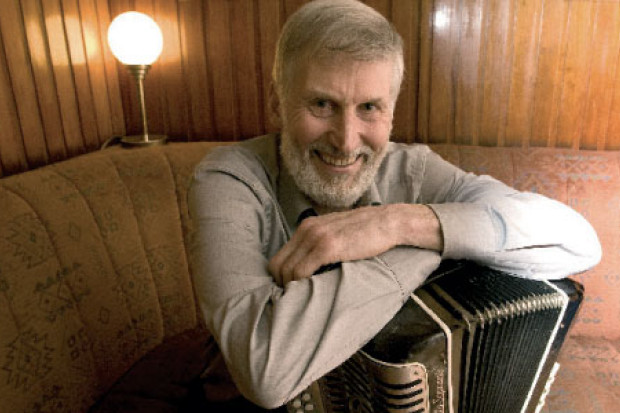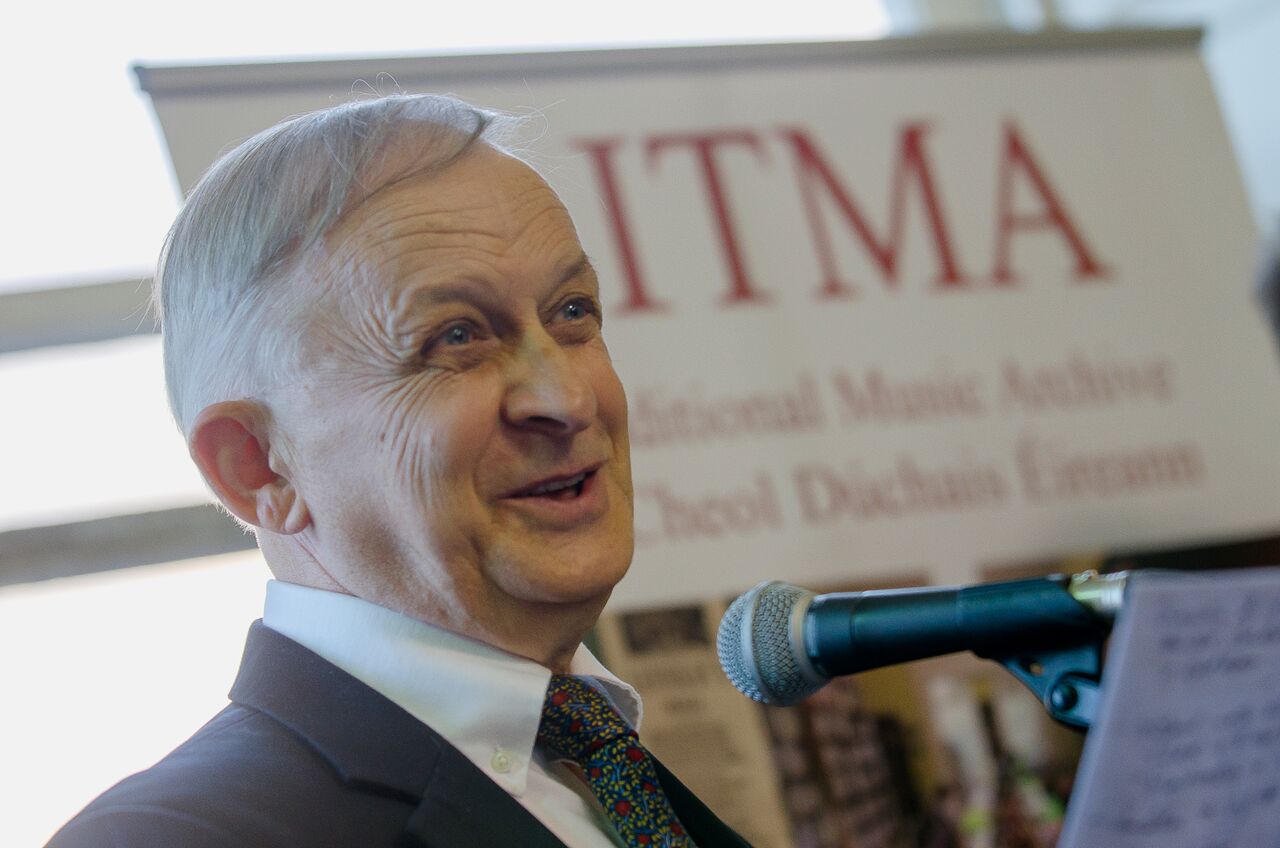
Nicholas Carolan (Photo: Donal Glackin)
Nicholas Carolan's Retirement Marked by ITMA
A reception took place at the Irish Traditional Music Archive last Thursday 24 September to mark the retirement of Nicholas Carolan as Director.
Carolan was a co-founder of the Archive and Director for 28 years. In July he was succeeded by Grace Toland. He will retain a voluntary role with the Archive as Director Emeritus.
The occasion, which current Chair Dermot McLaughlin described as ‘an opportunity to say thank you, not just from the people in this room but people all over Ireland and all over the world who have been touched by [Nicholas Carolan’s] work for music’ was attended by a large gathering of musicians, singers, collectors, researchers and representatives of music and arts organisations.
Sheila Pratschke, Chair of the Arts Council, paid tribute to Carolan and said:
Nicholas Carolan has been a charismatic and visionary Director, a passionate advocate for the Archive, a valued partner for the Arts Council, and a great, great teacher. Not least, he has taught us what riches lie in our own unique musical tradition, and has secured into the future the support of An Chomhairle Ealaíon for the preservation of our heritage, that heritage on which the present and the future of our music is based, the ground from which it grows.
Fintan Vallely, Editor of The Companion to Irish Traditional Music, who gave the main address, said:
I see in his work the same intensity, dedication and, often, humour, that many of us were so deeply affected by in Breandán Breathnach … [A]s Hugh Shields once remarked, this music is neither mere ancestral pop nor is it an arbitrarily or politically preserved ‘past-ness’. It is a folk music which is infused with ethos and artistry of the pre-16th century harp music (the highest-evolved form of Irish music expression in its time). That residue may only be expressed inconsistently today, but it is there, it is distinctive, and something which alone demands looking after….
Past generations may indeed have been poor, and without property, but their intellectual material had the same potential as it still has today: we have always had alert and creative minds in music composition, and what this Archive preserves, as a comprehensive resource, is the material record of the Irish people’s aesthetic sensibility, functional creativity, and cultural consistency.
Nicholas Carolan’s parting gift to us all is access to all of this, through the thousands of kilometres of music vibrations on disc and tape, the infinite cloud of digital reserves, and forests-worth of words from the past and present. He has secreted this from the ruthlessly ever-modernising world, which would, if left alone, declare it obsolete, have mislaid it, or dumped it. We here today – and indeterminable generations to come as well – are enabled to use these resources as a lifeline via Nicholas’ legacy institution so that we might be able to feel traditional music’s vibrations fresh forever in our ears and under our fingers.
Nicholas Carolan wished the new Director, Grace Toland, well in her appointment, and paid tribute to Harry Bradshaw, who co-founded ITMA in 1987. He also paid tribute to the staff, Board members and to the four Chairs of the Archive since its founding – the late Tom Munnelly, Prof. Mícheál Ó Súilleabháin, Cathal Goan and Dermot McLaughlin.
Among many developments during his tenure, Carolan mentioned the development of the television series Come West Along the Road, and the introduction of digitisation and internet publication, as giving an added dimension to ITMA’s work. The television series, which focused on archive footage and came about as a result of an invitation from RTÉ producer and musician Tony MacMahon, was presented by Carolan and became the longest running television series on Irish traditional music. The development of digitisation and the internet meant that the Archive could bring materials to people anywhere in the world, rather than only being a place that people had to come to.
Carolan concluded by saying,
This is a collection of the materials of Irish traditional music and of information on Irish traditional music, but it is not Irish traditional music. Irish traditional music is a living thing, created nightly, daily, not just in Ireland north and south, not just among the Irish diaspora, but in very many parts of the world. The Archive exists to support and enrich that living tradition – to connect it with its past – but we really value traditional music as a contemporary Irish art form, a living art, as important as Irish literature, visual art, theatrical arts, or any other art form – and that has been a guiding principal for me over the last 28 years.
The staff and Board of ITMA presented Carolan with a bow made by Steffen Kuhnla on a custom-made maple and mahogany plinth made by Dermot Toland.
The Irish Traditional Music Archive is the largest collection of its kind in the world. For more on ITMA’s work, visit www.itma.ie












